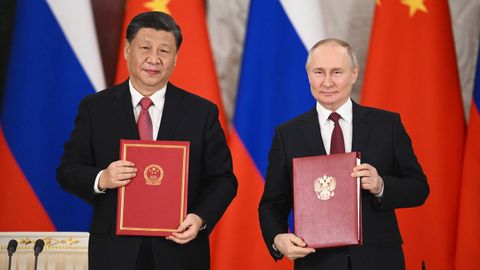
Xi Jinping and Vladimir Putin at the signing of joint agreements this Tuesday in Moscow. VLADIMIR ASTAPKOVICHSPUTNIK| EFE
The Russian leader points out that his relationship with the Asian giant “is at the best moment in its history”
Russian President Vladimir Putin did not rule out the possibility “Chinese plan” to achieve peace in Ukraine and indicated that “it could serve as a basis for finding a political solution” to the war after a meeting with his Chinese counterpart Xi Jinping this Tuesday in Moscow according to Europa Press.
Thus, the president described his negotiations with Xi as “successful and constructive”, with whom he held a meeting that lasted up to three hours. “We are proud to once again have the opportunity to receive our dear friend Xi Jinping during his state visit to Russia”he said earlier, arguing that a resolution to the conflict in Ukraine “requires respect for the security concerns of all countries.”
“Our delegations participated in our talks yesterday and today, and they took place successfully, warmly and in a constructive atmosphere”he pointed out at a joint press conference where he announced the signing of two declarations that “show the special nature of the relationship” between the two countries.
For Putin, these relations are actually “at the best moment in history and are an example of strategic and thorough interaction” between the parties, according to information from the Interfax news agency. “Russia and China are united by strong neighborly relations, mutual aid, friendship between nations and active dialogue at all levels. We are in constant contact with China,” Putin pointed out, stressing that this enables both countries “to find solutions to all problems (…) and keep the international agenda under control.”
The two leaders proceeded to sign a declaration on the development of economic cooperation and another on strengthening the association of “comprehensive and strategic cooperation” in the region, although a dozen documents are expected to be signed by the end of the summit. In this sense, they confirmed the importance of bilateral relations, especially in economic and trade matters, as a top priority.
The text of China’s peace plan
both presenters they dealt with the peace plan point by point that China has designed to end the war in Ukraine, a twelve-point initiative. The document, presented on February 24 on the occasion of the first anniversary of the conflict that Russia started in Ukraine at the behest of Putin, outlines China’s position “for a political solution to the crisis in Ukraine.” The pillars of the Chinese initiative are:
— Respect for the “sovereignty of all countries” and “their territorial integrity”.
— Abandoning the “Cold War mentality” and respecting the “legitimate security concerns of countries”, something Beijing has repeated since the beginning of the invasion, in relation to Russia.
— A cease-fire and a call for “restraint” to “prevent the crisis from further worsening or even spiraling out of control.”
— Continuation of peace negotiations, given that “dialogue and negotiations are the only viable way out to resolve the crisis.”
— Solving the humanitarian crisis, “effective protection of civilian safety” and “establishment of humanitarian corridors for their evacuation from war zones”.
— Support for the “Russian-Ukrainian exchange of prisoners” and the cessation of “attacks on civilian objects”.
— Protecting the safety of nuclear power plants and stopping “armed attacks on nuclear power plants”.
—”Reducing strategic risk,” which includes an emphasis that “nuclear war should not and cannot be waged.”
— Grain export guarantee, in which the United Nations must “play an important role.”
— An end to “unilateral sanctions” for “failing to solve problems and perhaps even creating new ones,” according to Beijing, which has voiced its opposition to sanctions against Moscow since the start of the war.
— Protection of the stability of industrial and supply chains, which includes a request to all parties to “oppose the politicization and instrumentalization of the world economy.”
— Support for Ukraine’s post-war reconstruction, something China is willing to “help.”
Project for a large gas pipeline
Putin, who has said Russia is ready to increase uninterrupted oil supplies to China, warned the country could be forced “to respond if the West decides to use weapons with nuclear components” and has not ruled out a trip to China between now and the end of the year despite the invasion of Ukraine, according to information from the TASS news agency. On the other hand, the Russian president announced that an agreement had been reached on “practically all parameters of the Power of Siberia 2 gas pipeline”.
“We tackled a good project. This is the new Power of Siberia 2, which goes through Mongolia. Almost all the parameters have been agreed upon,” he explained in relation to the large gas pipeline through which he wants to export natural gas from Siberia to northwestern China. Xi thus emphasized that Russia and China will intensify hydrocarbon trade and cooperation in economic matters, praising the talks and evaluating them as “fruitful”. “We have just had very honest, friendly and productive negotiations,” he noted.
In addition, he emphasized the importance of achieving peace in Ukraine “through dialogue”, a position he has already expressed on previous occasions. “We are firmly committed to the principles of the UN Charter, we maintain an objective and impartial attitude”he expressed before both leaders showed their position categorically against “any kind of independence in Taiwan”.
Putin used this opportunity to confirm that he has no intention of meeting with his American counterpart Joe Biden in the near future. This was hinted at by the advisor to the Russian presidency, Yuri Ušakov “Such a meeting is not planned”.
Source: La Vozde Galicia
I am Amelia James, a passionate journalist with a deep-rooted interest in current affairs. I have more than five years of experience in the media industry, working both as an author and editor for 24 Instant News. My main focus lies in international news, particularly regional conflicts and political issues around the world.







